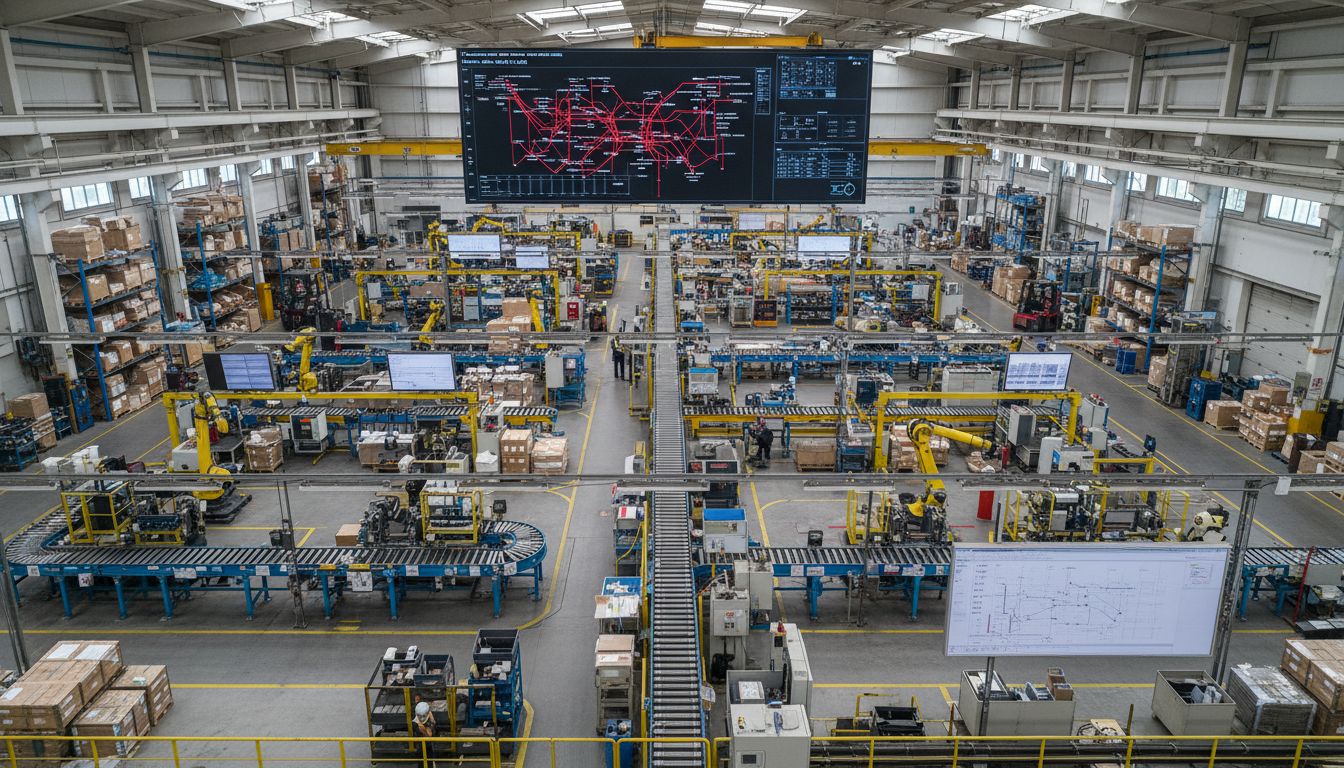Why Invest in AI Now: Understanding the Benefits Ahead

AI has moved from science fiction to the backbone of smart business strategy. Over 50 percent of small businesses are already exploring ways to use AI in their daily operations. That sounds high tech and intimidating at first, but the real surprise is how fast and practical these changes are becoming for everyone. Businesses of all sizes are using AI to save time, cut costs, and work smarter than ever before—and it is not just the big players who win.
Table of Contents
- The Significance Of AI In Today’s Business Landscape
- Understanding The Economic Impact Of AI On Small And Medium Enterprises
- Key Advantages Of Early AI Adoption For Business Growth
- How AI Revolutionizes Operational Efficiency And Decision Making
- Real-World Success Stories: Businesses Thriving With AI
Quick Summary
| Takeaway | Explanation |
|---|---|
| AI boosts operational efficiency significantly | Businesses implementing AI can streamline processes and reduce errors through intelligent automation, leading to greater productivity. |
| Data-driven decision making enhances business outcomes | AI enables organizations to analyze patterns and predict trends, fostering informed strategic decisions that drive performance. |
| Early AI adoption provides competitive advantages | Companies that integrate AI technologies early can establish more efficient workflows and build institutional knowledge before competitors catch up. |
| AI fosters personalized customer experiences | Leveraging AI allows businesses to tailor their offerings, enhancing customer satisfaction and loyalty through targeted interactions. |
| Successful AI integration requires human collaboration | A blend of AI’s capabilities and human expertise yields the best results, ensuring technological innovations align with business goals. |
The Significance of AI in Today’s Business Landscape
The business world stands at a transformative crossroads where artificial intelligence is no longer a futuristic concept but a practical strategic tool for competitive advantage. According to the National Institute of Standards and Technology, AI technologies are fundamentally reshaping how organizations operate, innovate, and deliver value.
Understanding AI’s Business Impact
Artificial intelligence represents more than technological advancement. It is a paradigm shift that enables businesses to unlock unprecedented levels of efficiency, insights, and strategic decision making. For business owners, AI offers the potential to automate complex tasks, predict market trends, personalize customer experiences, and optimize operational workflows.
The core significance of AI lies in its ability to process massive amounts of data exponentially faster than human capabilities. Machine learning algorithms can analyze patterns, identify trends, and generate actionable insights that would be impossible through traditional analytical methods. This computational power translates directly into business value across multiple domains.
Strategic Implications for Modern Enterprises
Businesses that successfully integrate AI are positioning themselves at the forefront of their industries. The strategic implications are profound:
- Enhanced operational efficiency through intelligent automation
- Data-driven decision making with predictive analytics
- Personalized customer experiences at scale
- Competitive differentiation through technological innovation
However, the true power of AI emerges not from technology alone, but from human expertise guiding its implementation. Successful AI integration requires a nuanced understanding of business objectives, technological capabilities, and the specific context of each organization.
For mid-tier businesses with substantial annual recurring revenue, AI represents a critical opportunity to streamline operations, reduce costs, and create new value streams. The key is approaching AI as a collaborative tool that amplifies human intelligence rather than a replacement for human expertise.
Understanding the Economic Impact of AI on Small and Medium Enterprises
The economic landscape for small and medium enterprises is undergoing a significant transformation through artificial intelligence. According to Reimagine Main Street, over 50% of small businesses are actively exploring AI implementation, recognizing its potential to revolutionize traditional business models.
The Economic Potential of AI Adoption
AI represents more than a technological upgrade. For small and medium enterprises, it is a strategic economic lever that can dramatically improve operational efficiency, reduce costs, and create new revenue opportunities. The ability to leverage AI can be a critical differentiator in increasingly competitive markets.
Small businesses can utilize AI to perform complex tasks that previously required significant human resources. Machine learning algorithms can now handle data analysis, customer segmentation, predictive maintenance, and even generate marketing content. This technological capability allows smaller organizations to compete more effectively with larger enterprises by minimizing operational expenses and maximizing productivity.
Strategic Economic Advantages
The economic benefits of AI for small and medium enterprises are multifaceted

:
- Reduced operational costs through intelligent automation
- Enhanced decision making with data-driven insights
- Improved customer targeting and personalization
- Faster response to market changes and customer needs
Moreover, AI enables businesses to scale their capabilities without proportionally increasing workforce or infrastructure expenses.
Below is a table summarizing the key business benefits of AI adoption for small and medium enterprises, helping highlight how AI drives both operational efficiency and strategic differentiation.
| Benefit | Description |
|---|---|
| Reduced Operational Costs | Automates repetitive tasks and optimizes workflows, lowering expenses without sacrificing results. |
| Enhanced Decision Making | Provides actionable insights using real-time analytics, supporting smarter business strategies. |
| Improved Customer Targeting | Enables data-driven segmentation and personalization, boosting marketing effectiveness. |
| Faster Response to Market Changes | Allows rapid adaptation to evolving customer needs and market dynamics. |
| Scalability Without Higher Costs | Expands business capacity through automation, avoiding proportional increases in staffing or overhead. |
| By automating repetitive tasks and providing advanced analytical capabilities, AI allows smaller organizations to punch above their weight in competitive marketplaces. |
The key to successful AI integration lies in strategic implementation. Small and medium enterprises must approach AI as a collaborative tool that augments human expertise rather than a complete replacement for human workers. This approach ensures that technological innovation remains aligned with core business objectives and maintains the unique human touch that distinguishes successful organizations.
Key Advantages of Early AI Adoption for Business Growth
Businesses that embrace artificial intelligence early gain substantial competitive advantages in an increasingly technology-driven marketplace. Stanford Digital Economy Research highlights how strategic AI adoption can unlock unprecedented opportunities for entrepreneurial growth and innovation.
Competitive Positioning Through Early Technological Integration
Early AI adoption provides businesses with a critical strategic edge. Companies that proactively integrate AI technologies position themselves ahead of competitors who remain hesitant or slow to adapt. This forward-thinking approach allows organizations to develop sophisticated technological capabilities, optimize operational workflows, and create more intelligent, responsive business models.
By investing in AI infrastructure and capabilities now, businesses can establish robust technological foundations that will become increasingly valuable as artificial intelligence continues to evolve. The learning curve associated with AI implementation becomes a competitive advantage, enabling companies to refine their technological strategies and build institutional knowledge faster than late adopters.
Transformative Business Growth Opportunities
The advantages of early AI adoption extend across multiple business dimensions:
- Accelerated innovation and product development cycles
- Enhanced predictive capabilities for strategic decision making
- Improved operational efficiency and resource allocation
- Creation of new revenue streams through intelligent service offerings
Moreover, early adopters gain the ability to experiment, learn, and adapt AI technologies specific to their unique business contexts. This experiential knowledge becomes a significant intellectual asset that cannot be quickly replicated by competitors who enter the market later.
The following table compares how early and late AI adoption influences core business capabilities, making it easier to see the strategic advantages of being an early adopter.
| Business Capability | Early AI Adoption | Late AI Adoption |
|---|---|---|
| Competitive Positioning | Leads the market and sets industry standards | Follows trends, harder to differentiate |
| Institutional Knowledge | Acquires deep AI experience and expertise swiftly | Faces steeper learning curve |
| Workflow Optimization | Refines processes sooner; faster efficiency gains | Adapts slowly with delayed improvements |
| Innovation Potential | Greater opportunity for experimentation and growth | Limited opportunity to shape innovations |
| Market Responsiveness | Rapid adaptation to changes and customer needs | Lags in agility and market adaptation |
Businesses must recognize that AI is not just a technological tool but a strategic approach to creating value. The most successful organizations will be those that view AI as a collaborative partner in their growth strategy, leveraging its capabilities to augment human expertise and drive meaningful organizational transformation.
How AI Revolutionizes Operational Efficiency and Decision Making
Artificial intelligence has emerged as a transformative force in organizational performance, fundamentally changing how businesses approach operational strategies and strategic decision making. According to McKinsey’s comprehensive industry survey, companies leveraging AI are experiencing unprecedented improvements in analytical precision and operational agility.
Enhancing Operational Performance Through Intelligent Automation
AI-driven technologies enable businesses to streamline complex operational processes by automating repetitive tasks, reducing human error, and accelerating workflow efficiency. Machine learning algorithms can analyze vast datasets in milliseconds, identifying patterns and generating insights that would take human teams weeks or months to uncover.
This intelligent automation extends beyond simple task completion. Advanced AI systems can predict potential bottlenecks, optimize resource allocation, and provide real-time recommendations that help businesses make more informed, data-driven decisions. The result is a more responsive, adaptable organizational infrastructure that can quickly adjust to changing market dynamics.
Strategic Decision Making Reimagined
The impact of AI on strategic decision making is profound and multifaceted:
- Predictive analytics that forecast market trends
- Risk assessment with unprecedented accuracy
- Personalized customer insight generation
- Resource optimization through intelligent modeling
By transforming raw data into actionable intelligence, AI empowers business leaders to move beyond intuition-based strategies. Human expertise combined with AI’s computational power creates a synergistic approach to complex problem solving. This collaborative model ensures that technological capabilities are always guided by nuanced human understanding and strategic vision.
Ultimately, AI is not about replacing human decision makers but providing them with advanced tools that enhance their natural cognitive capabilities. The most successful organizations will be those that view AI as a strategic partner, leveraging its analytical strengths while maintaining human creativity and contextual understanding at the core of their decision-making processes.
Real-World Success Stories: Businesses Thriving with AI
The transformative potential of artificial intelligence extends far beyond theoretical discussions, with businesses across various sectors demonstrating remarkable success through strategic AI implementation. The Small Business Administration’s AI Innovation Workshop has highlighted numerous examples of how AI can drive tangible business growth and competitive advantage.
Innovative Problem Solving Through AI Integration
AI is not just a technological tool but a strategic problem-solving platform that enables businesses to reimagine their operational approaches. Companies that successfully integrate AI are discovering unprecedented ways to address complex challenges, optimize resources, and create value for their customers.
Small and medium enterprises are particularly well-positioned to leverage AI’s transformative capabilities. By implementing intelligent technologies, these businesses can level the playing field with larger competitors, creating more agile, responsive, and data-driven organizational models. The key lies in understanding AI as a collaborative tool that amplifies human expertise rather than a replacement for human intelligence.
Breakthrough Strategies Across Industry Sectors
Successful AI implementation demonstrates remarkable versatility across different business domains:
- Retail businesses using AI for personalized customer recommendations
- Manufacturing companies optimizing supply chain predictive maintenance
- Healthcare providers improving diagnostic accuracy and patient care
- Financial services enhancing fraud detection and risk management
These success stories share a common thread: businesses that approach AI as a strategic partner, not just a technological solution.
The most effective AI integrations are those where human creativity and technological capability work in seamless collaboration.

By maintaining a human-centric approach, organizations can unlock AI’s full potential while preserving the unique insights and intuition that drive true innovation.
Turn AI Advantages Into Real Business Value With Average Robot
You have just learned why early investment in artificial intelligence is critical for staying ahead in the modern marketplace. The article highlights the competitive edge that comes from using AI for streamlining decision making, automating operations, and accelerating growth. Yet, many business owners feel overwhelmed by AI complexities or struggle to find the right approach for real-world impact. If your mid-tier business wants to unlock AI’s benefits without getting lost in technical jargon, you do not have to navigate this journey alone.

Let Average Robot become your dedicated AI Council. We partner directly with $20m+ ARR business owners to build tailored AI strategies that elevate performance and simplify change management. Our proven roadmaps, step-by-step playbooks, and hands-on support empower you to automate routine work, boost your team’s engagement, and future-proof your business—all while keeping human insight at the core. Ready to transform insights from this article into strategic action? Explore how our expert team can help you claim your AI advantage by visiting Average Robot’s Main Site today. Act now to secure your market position and turn tomorrow’s opportunity into today’s results.
Frequently Asked Questions
What are the main benefits of investing in AI now?
Investing in AI now provides businesses with enhanced operational efficiency, data-driven decision making, personalized customer experiences, and competitive differentiation through technological innovation.
How can AI improve operational efficiency for small businesses?
AI improves operational efficiency for small businesses by automating repetitive tasks, analyzing vast amounts of data quickly, and enabling predictive analytics that informs smarter business strategies.
How does AI influence decision-making processes in businesses?
AI influences decision-making by providing predictive analytics, risk assessments, and personalized insights, which help business leaders move beyond intuition and make data-driven decisions.
In what ways can AI create new revenue opportunities for businesses?
AI creates new revenue opportunities by enabling businesses to optimize their marketing strategies, enhance customer targeting, and introduce intelligent service offerings that cater to evolving consumer needs.
Recommended
- 5 Costly Mistakes Businesses Make When Implementing AI…What Successful Business Owners Do Differently. — Average Robot
- About | Discover Opportunities - Schedule Today — Average Robot
- About | Discover Opportunities - Schedule Today — Average Robot
- About | Discover Opportunities - Schedule Today — Average Robot
- The Impact of AI on SEO in 2025: Key Changes for Businesses




